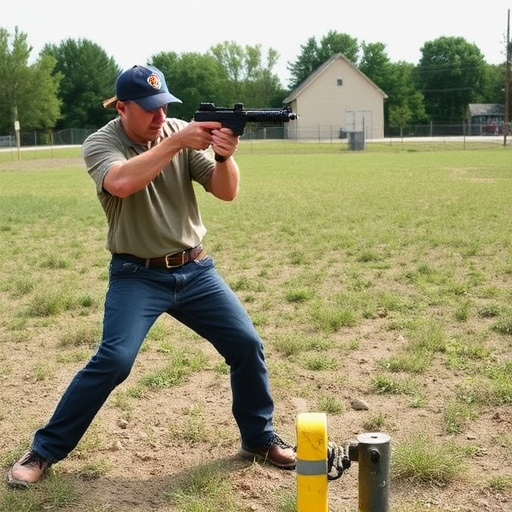Stun gun carrying laws in the US vary widely by state, impacting personal protection for civilians. These laws cover permit requirements, restricted areas, and workplace policies that may prohibit stun guns on business premises due to liability concerns. Understanding local regulations is crucial for legal compliance and safe use, especially for travelers and workers.
“Uncovering the legal landscape surrounding civilian stun gun ownership, this comprehensive guide delves into state-specific regulations and their impact on non-law enforcement individuals. From understanding the legal framework of stun gun ownership to navigating workplace policies, this article provides an in-depth look at requirements for acquiring and carrying tasers.
Explore state-by-state differences, permits, licenses, restrictions, and citizens’ rights, ensuring you’re informed about the legal aspects of stun gun carrying.”
- Stun Gun Ownership: Legal Framework Overview
- State-Specific Requirements for Civilian Use
- Workplace Policies on Non-Law Enforcement Tasers
- Permits and Licenses: What You Need to Know
- Restrictions and Prohibitions Across States
- Rights and Responsibilities of Citizens Owning Tasers
Stun Gun Ownership: Legal Framework Overview

In the United States, stun gun ownership and carrying laws vary significantly from state to state, creating a complex legal framework for civilians looking to purchase and carry personal protection devices. Generally, states have enacted specific regulations governing stun guns, which often fall under the category of less-lethal or non-deadly force tools. These laws cover aspects such as permit requirements, prohibited areas, and restrictions on who can own and carry stun guns.
Workplace policies also play a crucial role in stun gun ownership. Some states allow employees to possess stun guns at their place of work for self-defense purposes, while others have strict prohibitions against bringing firearms or stun devices onto business premises. Understanding these laws is essential for individuals seeking to exercise their right to carry a stun gun while navigating the complexities of state and workplace regulations.
State-Specific Requirements for Civilian Use
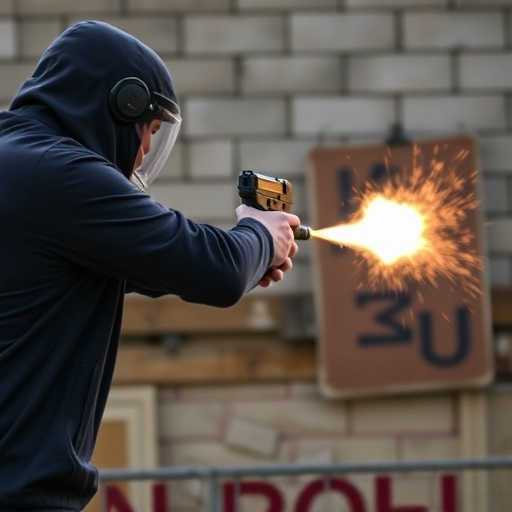
In the United States, each state has its own set of regulations governing civilian stun gun ownership and carrying. These laws vary widely, determining who can possess a stun gun, where they can be carried, and under what circumstances. Some states allow anyone over a certain age to carry a stun gun without a permit, while others mandate a background check or even a concealed weapon license. Certain workplaces may also have specific rules regarding stun gun carrying by employees, further complicating the picture for civilians looking to arm themselves with this non-lethal force option.
Navigating these state-specific requirements is crucial for ensuring compliance and safe use of stun guns. For instance, some states permit open carry, allowing individuals to openly display their stun gun without concealment, while others require it to be stored in a locked container or holster. Understanding the specific laws of your state is essential, especially if you travel frequently, as these regulations can significantly impact your ability to legally and safely carry a stun gun for personal protection at work or elsewhere.
Workplace Policies on Non-Law Enforcement Tasers
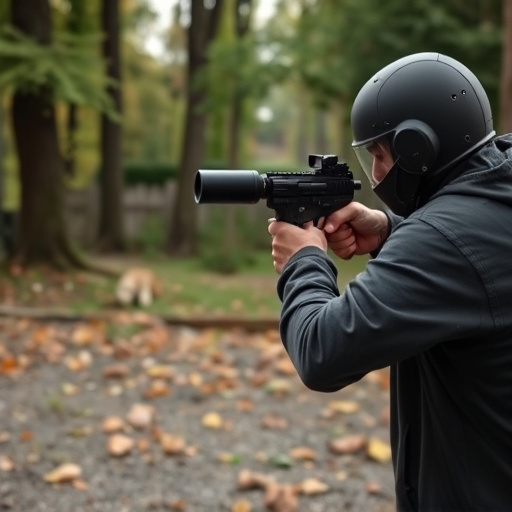
In many states, the possession and carry of non-law enforcement stun guns, commonly referred to as tasers, are subject to specific regulations, including restrictions on where and how they can be used. When it comes to workplace policies, several factors come into play. Firstly, employers must ensure that their employees are trained properly in the use of any type of self-defense tool, including stun guns, for safety reasons. Secondly, workplaces with high security or risk levels might allow the carry of personal protection devices like tasers, but this is typically regulated by internal policies and not solely by state laws on stun gun carrying.
Workplace regulations often consider public safety and the potential risks associated with allowing employees to carry stun guns. Some companies may prohibit their use in certain areas or situations to maintain a safe and secure environment for all workers. Additionally, there might be legal implications if an employee uses a stun gun on another employee or customer, as these devices are not typically licensed for defensive purposes by law enforcement agencies.
Permits and Licenses: What You Need to Know
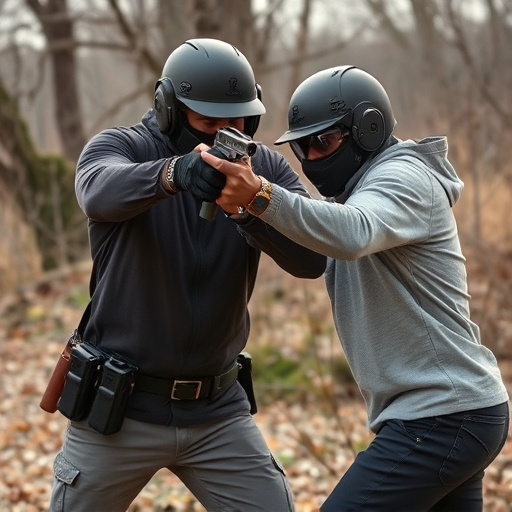
In many states, civilian ownership of stun guns, often referred to as tasers, is regulated by strict permit and licensing requirements. These laws vary widely across the US, so understanding your state’s specific regulations is crucial before considering stun gun carrying. Obtaining a permit typically involves a thorough background check, which ensures that only eligible individuals can legally own these devices. Some states issue permits for personal protection, allowing citizens to carry tasers for self-defense outside the workplace. However, certain workplaces may have their own policies and restrictions on stun gun use, adding another layer of complexity.
When considering stun gun carrying laws, it’s essential to stay informed about local regulations and any additional guidelines from employers or facilities where you spend significant time. Keeping up with these requirements ensures compliance with both state laws and personal safety protocols, as not all workplaces permit the open carry of stun guns even if they’re legally owned.
Restrictions and Prohibitions Across States

Restrictions and Prohibitions vary widely across states regarding civilian stun gun carrying, with some permitting open carry while others mandate permit-to-carry or even outright bans. These laws can be influenced by local crime rates, public safety concerns, and cultural attitudes towards firearms. In terms of stun gun use in the workplace, many companies have their own policies prohibiting personal weapons, including stun guns, on their premises due to liability issues and potential disruption to the work environment.
Some states explicitly prohibit the use of stun guns for self-defense outside of specific situations, such as during an assault or against a person attempting to enter a private residence. Additionally, there are often restrictions on where stun guns can be carried, like schools, courts, and government buildings, to prevent misuse and ensure public safety. These stun gun carrying laws vary significantly from state to state, so it’s crucial for prospective owners to research and understand the regulations in their area before purchasing and carrying a stun gun.
Rights and Responsibilities of Citizens Owning Tasers
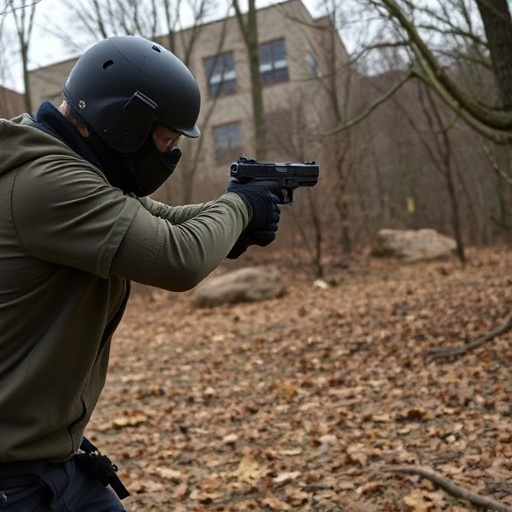
Citizens who choose to own a taser, or stun gun, as it’s often called, must be aware of their rights and responsibilities under state laws. While some states allow individuals to carry stun guns openly or concealed, others have specific restrictions regarding where and how they can be used. For instance, many workplaces have policies prohibiting personal weapons, including tasers, on their premises for employee and safety reasons. It’s crucial that citizens check local and state regulations before acquiring a taser to ensure compliance with the law.
Own a stun gun responsibly by understanding the legal implications of carrying it in public spaces. Be informed about safe handling practices to avoid accidental discharges. Additionally, citizens should respect the rights and safety of others, especially in workplaces, by adhering to relevant policies and laws regarding weapon possession. This balance between personal protection and public safety is essential for a peaceful and secure environment.
In conclusion, understanding the complex web of state laws regarding civilian stun gun ownership is essential for citizens looking to exercise their rights. From permit requirements to restrictions on workplace usage, navigating these regulations is crucial. As the legal landscape evolves, staying informed about your state’s specific rules ensures responsible and compliant stun gun carrying. This knowledge empowers individuals to make informed decisions while adhering to the law, fostering a safer environment for all.
